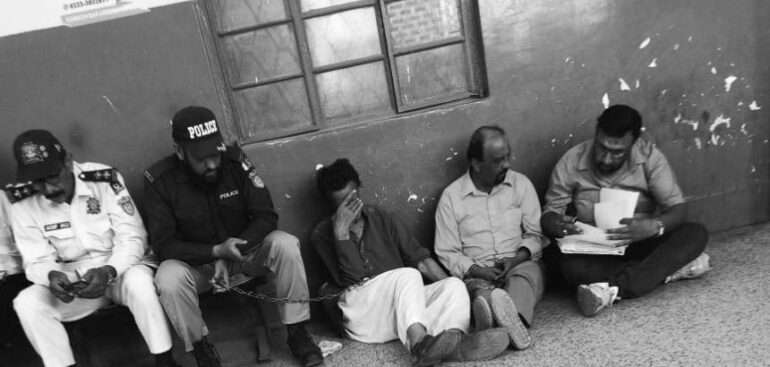Fear clung to the two elderly men in the grainy video, their cuffed and chained hands a heart-wrenching symbol of helplessness. Around them, a hostile crowd roared slogans about the “finality of Prophethood,” their voices heavy with intolerance and anger. Men in black coats—the familiar uniform of Pakistan’s legal profession—stood not as protectors of justice, but as part of this suffocating storm of hatred.
One of the men, dressed simply in a plain shalwar kameez, bowed his head, crushed beneath the weight of the moment and the injustice pressing down on him. His silent despair cut deeper than any words. Beside him, the other man, his French beard neatly trimmed, turned away from the intrusive glare of a phone camera. His dignified demeanor starkly contrasted with the disarray of his circumstances—an image of grace amidst humiliation.
An unseen voice proudly declared, “We are happy that the court has refused to admit the Qadianis’ appeal.” Yet, the temporary relief of this hostile crowd soon darkened into tragedy. For the man in the blue shirt and trousers, those days would be his last—he would die while in judicial custody, silenced by a system that failed to protect him.
The Human Story Behind the Headlines
Dr. Tahir Mahmood was not just another name in a police record. A homeopathic doctor by profession, he was also the President of the Ahmadi community’s local chapter in Malir’s Khokrapar Colony. On March 10, 2025, he was arrested—not for a crime, but for a peaceful act: performing Friday prayers. Alongside him, another community member was detained, and an FIR was registered against them.
The Ahmadi community condemned this arrest and the subsequent death of Dr. Tahir with deep sorrow and outrage, calling it “unjust imprisonment for an innocent act of faith.” This was not an isolated event but part of a larger, painful pattern.
Just weeks before, on February 14, extremist members of Tehreek-e-Labbaik (TLP), notorious for their violent opposition to Ahmadis, held a protest outside the community’s place of worship, the Ahmadiyya Bait-uz-Zikr in Malir, also known as “Bait-un-Nasr.” They demanded the mosque be sealed, and the police, bowing to pressure, complied. By February 18, the place of worship was shut, and a case was registered against the community’s leaders.
Despite an initial grant of pre-arrest bail, on March 10, that bail was denied. Dr. Tahir Mahmood and two other office bearers were arrested right at the court premises. An appeal was filed in the Sindh High Court, but hope dwindled.
A Courtroom Turned Battlefield
On March 12, 2025, the City Court of Karachi rejected bail applications for Dr. Tahir Mahmood and his companions, under charges notoriously used to target the Ahmadi community—Sections 295 and 298 of the Pakistan Penal Code.
The courtroom, which should have been a place for calm deliberation and fairness, erupted into chaos. Hundreds of lawyers, clerics, and TLP supporters flooded the space, chanting hateful slogans and pressuring the judge.
Irfan (not his real name), an eyewitness, recalled the scene with a mixture of fear and anger. “Suddenly, from seven TLP activists, the crowd swelled to over a hundred. They verbally abused and physically attacked Dr. Tahir Mahmood, who was also known for his social welfare work, which only enraged the extremists more.” The same faces who showed up for this hearing had been present at the lynching of another Ahmadi, Laeeq Ahmad, just a month before.
“The judge, pressured by threats of violence, allegedly reassured the extremists that bail would be denied,” Irfan added. The intimidation was methodical—organized by known figures such as Manzoor Ahmad Rajput, infamous for land grabbing, and with tip-offs from Sunni Tehreek operatives who tracked court proceedings.
When bail was denied, the mob descended on the two elderly men, dragging them from the courtroom and beating them mercilessly. “They didn’t care that these men were old. They beat them so badly the police had to intervene, warning the crowd that the men might die if the violence continued,” Irfan said.
Yet, even after the brutal assault, the attackers filmed the battered men and gleefully posted the videos online, proud of their cruelty.
Weaponized Laws and Impunity
The charges against Dr. Tahir Mahmood and his companions are baseless and politically motivated. Sections 295 and 298 of the Pakistan Penal Code have been repeatedly used as weapons to oppress the Ahmadi community. The complainant in this case, Shoaib Khan, is a known TLP official, a group that regularly orchestrates hate campaigns and violent acts with near-total impunity.
This is not just a legal tragedy. It is a human tragedy — of dignity crushed, of faith criminalized, and of a community living in fear under the shadow of relentless persecution.
A Call for Compassion and Justice
Behind the cold facts and harsh slogans are human lives—fathers, grandfathers, healers, and believers—who seek only the right to worship in peace. The story of Dr. Tahir Mahmood is a stark reminder that justice cannot be selective and that the law must protect all its citizens, regardless of their faith.
When fear and hatred are allowed to dictate the course of justice, the entire society suffers—not just the persecuted, but the very fabric of humanity itself.
